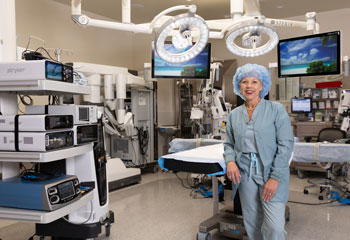
Colonoscopy
Stay proactive with your health! Learn how a colonoscopy can help detect potential issues early at UCI Health.
At UCI Health, we offer advanced colonoscopy procedures, including techniques not commonly available in the region.
Our approach to colonoscopy
At UCI Health, we recognize that each patient is unique, so we offer personalized options to meet your needs.
Personalized preparation and care options
- For patients with conditions like heart failure or renal failure, we recommend gentler prep methods to minimize risk.
- For patients with complex medical issues, such as morbid obesity or sleep apnea, we often suggest anesthesia for added safety, ensuring comfort and protecting airways.
- Some patients prefer to undergo the procedure without sedation. For those who wish to return to work or resume activities quickly, we offer sedation-free colonoscopies.
Flexible scheduling and convenience
We understand the importance of your time. Like many of our patients, you can choose to schedule your colonoscopy at a time that works for you. Fit it in early in the morning to return to your daily routine or whatever is best for your personal schedule.
Frequently asked questions about colonoscopy
Who should get a colonoscopy?
Colonoscopy is an important screening tool for colon cancer, recommended starting at age 45 for most people.
If you're at average risk, you have a 1 in 22 chance (for men) or 1 in 25 chance (for women) of developing colon cancer.
Less invasive options like the annual fecal immunochemical test (FIT) or Cologuard can help detect colon cancer early, but colonoscopy remains the most effective preventive measure, with screenings every ten years if clear.
If colon cancer runs in your family, especially in a close relative diagnosed before 70, start screening at 40. Alternatively, start screening ten years younger than the diagnosis age and repeat every five years.
People with Lynch syndrome, which increases colon cancer risk to 60-80 percent, should have genetic testing and colonoscopies every one to three years.
How long does a colonoscopy take?
A colonoscopy typically takes about 30 to 60 minutes, depending on your individual needs.
If you choose sedation, you'll be given time to rest afterward, so the total appointment may last a bit longer. Our team works to ensure you’re comfortable throughout the procedure. You can usually return to your normal activities the same day once you’ve fully recovered from any sedation.
What happens if the colonoscopy detects abnormalities?
If a colonoscopy detects abnormalities, the most common finding is polyps, which are often benign but may be precancerous.
In some cases, we may find signs of inflammation or conditions like inflammatory bowel disease (Crohn's disease or ulcerative colitis)
If you're having the procedure due to unexplained bleeding, we might identify small blood vessels that can be treated immediately.
Any tissue samples taken will be sent for analysis, and you'll receive a follow-up recommendation based on the results, such as scheduling another colonoscopy in a few years.
Benefits of colonoscopy at UCI Health
At UCI Health, we offer unique benefits to make your colonoscopy experience as comfortable and personalized as possible.We provide water-exchange colonoscopy, a technique that reduces discomfort and the need for sedation.
We also offer colonoscopies with little or no anesthesia, allowing you to stay fully aware during the procedure.
Your safety and comfort are our top priority, and if at any point you feel anxious or uncomfortable, we’re here to adjust and ensure you feel relaxed and supported.
How should I prep for colonoscopy?
Preparing for a colonoscopy is an important step, and at UCI Health, we offer personalized prep options tailored to your specific needs.Your doctor will recommend a preparation plan based on your health, including the best type of solution and instructions to follow.
In most cases, you’ll need to adjust your diet a few days before the procedure, avoid certain foods, and take a special laxative to clear your colon.
If you have any medical conditions, such as heart or kidney problems, we can suggest gentler prep methods to ensure your safety and comfort.
We understand that prep can be challenging, but our team is here to guide you at each step.
What happens after my colonoscopy?
After your colonoscopy, our team will provide personalized care to ensure your comfort and guide you forward.If we remove polyps or take biopsies, you’ll receive results within a few days. Your doctor will discuss any findings with you and recommend follow-up care, including when to schedule your next colonoscopy based on your individual risk factors.
Most patients feel fully recovered by the end of the day, though you may need someone to drive you home if you were sedated.
Why choose us for colonoscopy?
The Chao Digestive Health Institute brings everything you need for digestive care under one roof. This means you’ll have access to a team of specialists, advanced diagnostic tools and personalized treatment plans all in one place. We strive to make your experience seamless and coordinated.As part of an academic medical center, we provide the highest standard of care, combining innovative research with personalized treatments. In fact, we developed artificial intelligence (AI) software that can dramatically improve adenoma detection rate (ADR), even among highly proficient colonoscopists.
We offer colonoscopy options that aren’t widely available, giving you more personalized choices. Our water-exchange colonoscopy technique helps reduce discomfort and may eliminate the need for sedation. We also offer the option for a colonoscopy with little or no anesthesia, so you can stay fully aware and in control during the procedure.

Take the next step
Help maintain your colorectal health by scheduling a consultation with our expert team. We're here to provide personalized options and support every step of the way.
Call 888-717-4463 to schedule an appointment
We welcome referrals from community physicians
Simply complete and fax the appropriate referral form to the Chao Digestive Health Institute.
We look forward to serving you and your patients.
Featured Blog Posts

Rethinking surgery for a next-generation hospital

Finding meaning, connection in Crohn's battle

Conquering rectal cancer with personalized care
Sarah Murad, 42, was shocked to be diagnosed with rectal cancer but her UCI Health team stopped it in its tracks.




